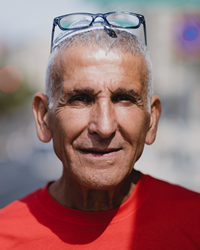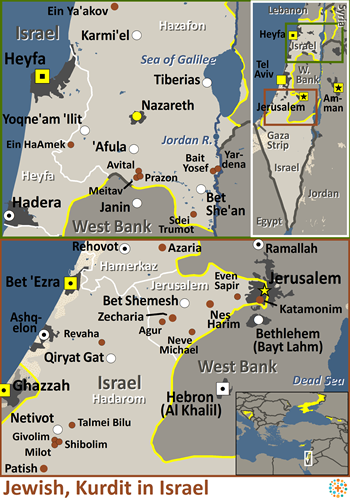Kurds are one of the oldest and largest ethnic groups in the Middle East. For hundreds of years, they have called an area encompassing parts of Turkey, Iraq, Syria, Iran, and Armenia home. They have never achieved a state of their own. Instead, distinctive Kurdish communities have maintained Kurdish culture and language in several countries, often in the face of hatred and violence from neighboring ethnic groups and central governments.
Many Jewish communities in Kurdish lands claim they have lived there for over 2,500 years, ever since the Jews of the northern kingdom of Israel were sent into exile there. The Old Testament) records in 2 Kings 15:17-22 30 that Hoshea became the last king of Israel and that the Assyrian king Tiglath-pileser III made him pay tribute to him. After Tiglath-pileser died (727), 2 Kings 17:1-6 Hoshea revolted against the new Assyrian king, Shalmaneser, who then invaded Israel taking Hoshea prisoner, and tried to take the city of Samaria. Eventually, "the king of Assyria (Sargon II) captured Samaria (722 BC) and exiled Israel to Assyria. He settled them in Halah and Habor (northern Syria today), by the Gozan River (tributary of the Euphrates River), and in the cities of Media (North-Western Iran today)" (Kings II, 17:1-6). These sites are currently listed within the Kurdish region.
Between 1949 and 1952, a series of airlifts, called "Operation Ezra and Nehemia" brought over 120,000 the Jewish Kurds to Israel, mainly from Iraq. Most of the Kurdish Jews today define themselves as Israeli and have adopted Hebrew as their primary language. Many of the older Kurdish Jews continue to speak Kurdish dialects in accordance to the region they came from in Kurdistan. The Kurdit Jews in Israel maintain a strong, cultural loyalty to their homeland. Life was hard for many of the Kurdish immigrants who came to Israel, as they were farmers accustomed to rural life and had to adjust to urban life.
The largest concentration of Kurdit Jews live in the Katamonim neighborhood located in south Jerusalem where they have their own synagogues and schools.
Currently there are over thirty agriculture settlements that have been started by Jewish Kurds, though many also have urban jobs. Many worked in construction, selling produce and a number opened up Kurdish restaurants which remain popular among the Jewish people in Jerusalem. Often when people go to a Kurdish restaurant, they are warmly greeted by the people who work there. It is not unusually to hear Kurdish music and singing in the background. New customers are introduced to many types of succulent Kurdish dishes. Kurdish Jewish women are known for keeping wonderful receipts that have been passed down through the generations. Siske, is a favored Kurdish pastry stuffed with beef and vegetables. The people feel that food gives them an opportunity to connect with others and make friends. One Kurdish Jewish man named his restaurant in Jerusalem Ishtabach. To the Kurds the name means "praise the lord; and a man (ish) who cooks (tabach).
The younger Kurdit Jews have pursued education and work in areas of medicine, computer software and business. Kurdit Jews people keep close family connections. An important part of Kurdish-Jewish life is found in their celebration of Saharane (sahar in Kurdish means–the crescent moon or spring moon). This is a festival that takes place over a few days usually at the closure of Passover. Traditionally it marks the end of winter and the coming of spring. Just as they did in their historic homeland, Kurdish communities gather and spend their days enjoying each other, singing, dancing and eating their traditional foods. Known for their warm hospitality, they always invite guests to join them.
Many Kurdit Jews in Israel firmly acknowledge their Jewish heritage in accordance to the readings of the Torah. They participate in Talmud, Mishnah and Jewish High Holidays. Their love of music is expressed in their worship through the chanting of parts of the Old Testament, particularly the Psalms through a unique melodic style. Often the biblical songs are sung in Aramaic which was the traditional written language of their Old Testament scripture. Although they acknowledge their Jewish identity many Kurdish-Israeli's are by nature secular. The younger generation are more concerned with education, jobs and succeeding financially.
Kurdit Jews have faced strong antisemitism in their homeland and coming to Israel has allowed them to enjoy their culture and spiritual roots. They are hard workers who tend to place importance on secular achievement. They need messianic believers to present God's word to them through the understanding of their Messiah Jesus, who was Jewish and fulfilled the prophecies so people would have his guidance in life, peace and salvation.
Pray the gospel will reach the Kurdit Jews people in Israel through Christian radio, friendships, music, and Messianic Jewish believers.
Pray that these people will be open to asking questions related to the gospel through caring Christians reaching out to them. May their questions and doubts be erased through the guidance of the Holy Spirit.
Pray that the Kurdit Jews will understand that they can accept Jesus without denying their Jewish identity.
Pray for a movement to Christ among this Kurdit Jews.
Scripture Prayers for the Jewish, Kurdit in Israel.
| Profile Source: Joshua Project |

























